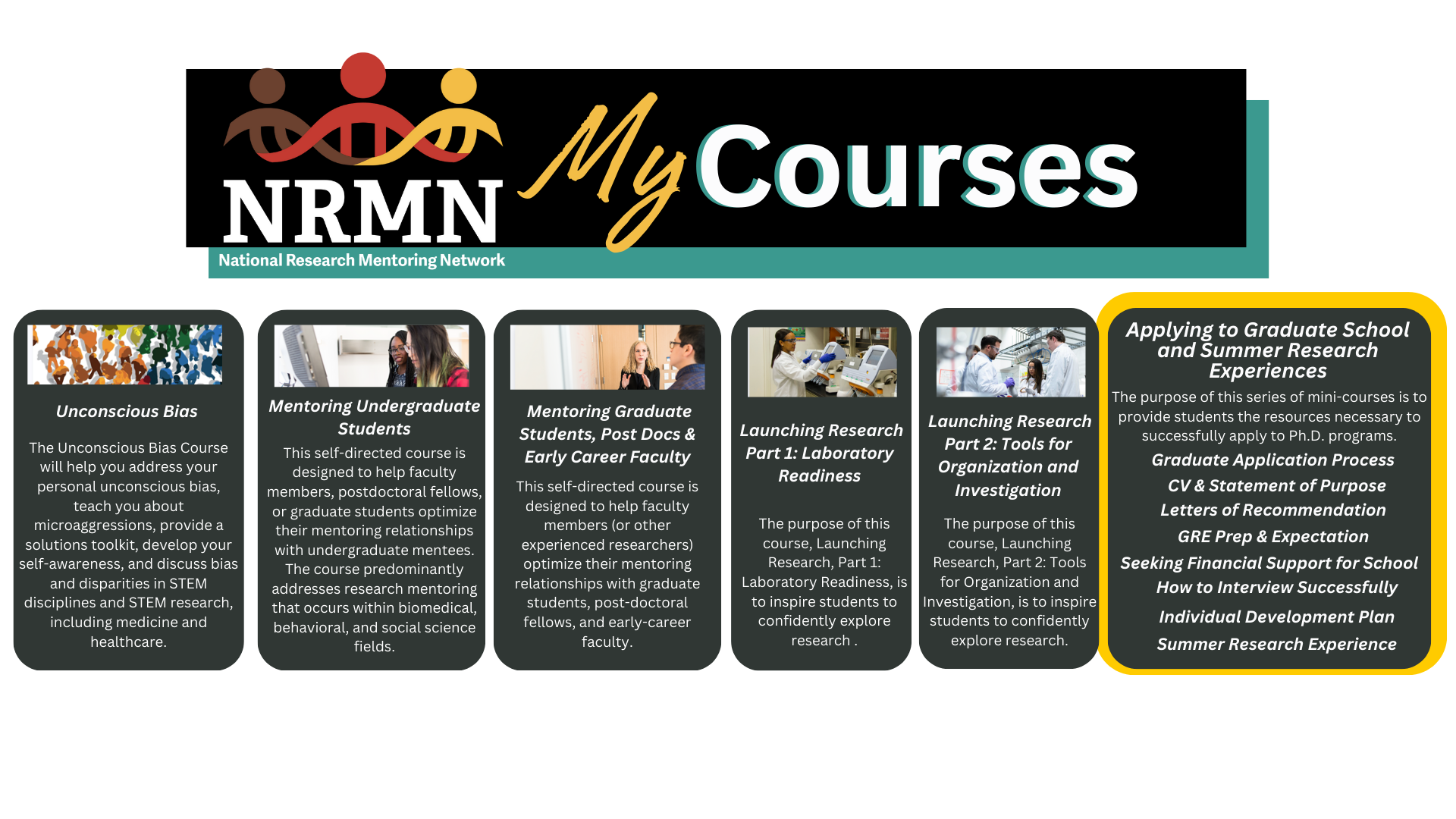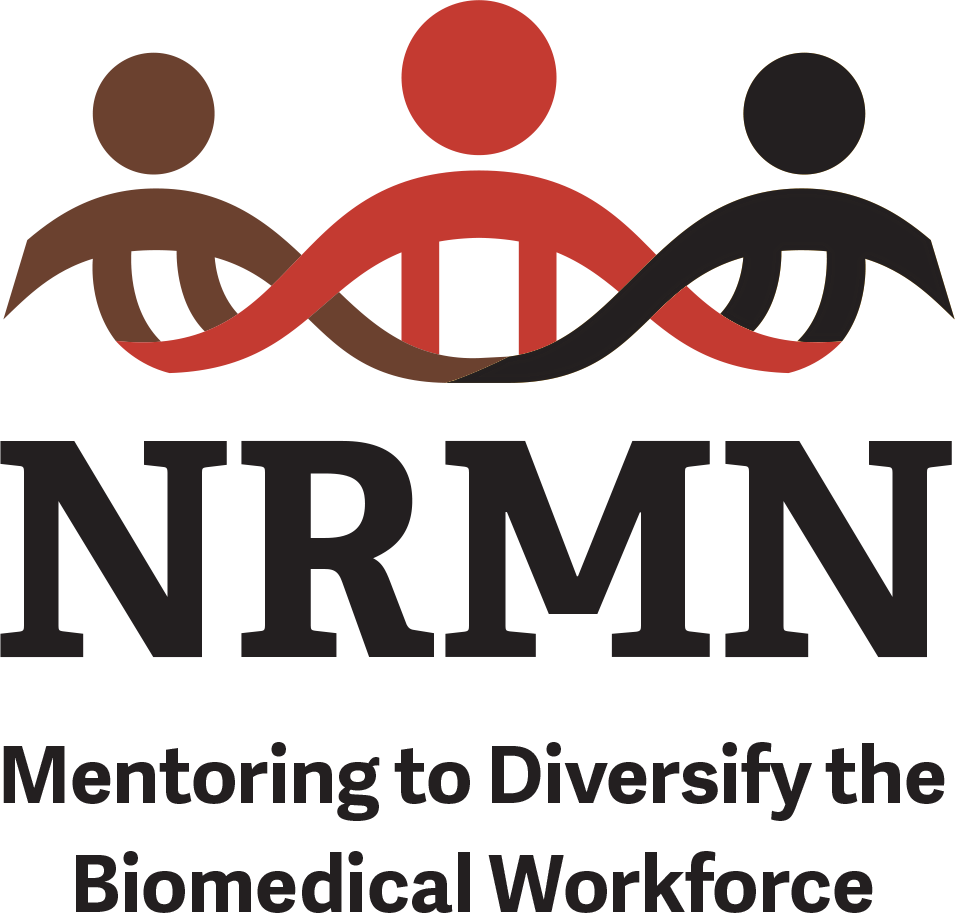
Enroll in our courses within MyNRMN:
REMINDER: If you are from an institution, program, or organization and would like to have your members (students, staff, faculty, others) take any of our courses, we can help you create your own cohort and start enrolling. Email us at info@nrmnet.net to get started.
Unconscious Bias Course
Unconscious Bias is a prejudice we have or an assumption we make about another person based on common cultural stereotypes, rather than on thoughtful judgement. Nobody is immune from unconscious bias, regardless of race/ethnicity, gender, orientation, etc., because humans have the tendency to make associations to help us organize our social worlds. Unfortunately, these biases can affect the type and quality of healthcare received, hiring practices, and workplace environments.
The Unconscious Bias Course will help you address your personal unconscious bias, teach you about microaggressions, provide a solutions toolkit, develop your self-awareness, and discuss bias and disparities in medicine and healthcare. A certificate is awarded upon completion of these modules. The course may be completed all at once or each module may be taken separately. There is no set completion window, but all five modules must be completed to receive credit for the course. Each module takes approximately 20 minutes to complete.
Launching Research Pt. 1: Laboratory Readiness
The purpose of this course, Launching Research, Part 1: Laboratory Readiness, is to inspire students to confidently explore research and acquaint them with skills that they will use throughout the course of their education and career. The purpose is also to introduce the concept that research can provide new and exciting opportunities. This course will help mentees or students get acclimated and introduced to the research laboratory and laboratory setting.
This course is divided into three modules. The first module introduces the user to research, provides guidelines for mentor and mentee responsibilities, and discusses the development of a professional image. The second module addresses research compliance including the protection of human subjects, the welfare of laboratory animals, and guidance for developing standard operating procedures. The third module covers research ethics including conflicts of interest, article perspectives, research articles, and provides instruction for creating and maintaining a laboratory notebook.
Each module will take approximately 45 minutes to complete, and users are able to pause between lessons within the modules. A certificate is awarded upon completion of the course.
Launching Research Pt. 2: Tools For Investigation and Organization
The purpose of this course, Launching Research, Part 2: Tools for Organization and Investigation, is to inspire students to confidently explore research and acquaint them with skills that they will use throughout the course of their education and career. The purpose is also to introduce the concept that research can provide new and exciting opportunities.
This course is divided into three modules. The first module introduces the user to data gathering, scientific and engineering methods, and data management and practices. The second module addresses the SWOT analysis, collaboration, research misconduct, and citation /reference management. The third module covers authorship and publication, theses and dissertations, scientific meetings, and intellectual property (patents and other IP).
Each module will take approximately 45 minutes to complete, and users are able to pause between lessons within the modules. A certificate is awarded upon completion of the course.
Mentoring Undergraduate Students
This self-directed course is designed to help faculty members, postdoctoral fellows, or graduate students optimize their mentoring relationships with undergraduate mentees. The course predominantly addresses research mentoring that occurs within biomedical, behavioral, and social science fields. However, many of the principles and approaches covered in this course are applicable to other disciplines and other types of mentoring relationships.
Mentoring Graduate Students, Post Docs & Early Career Faculty
A self-directed course is designed to help faculty members (or other experienced researchers) optimize their mentoring relationships with graduate students, post-doctoral fellows, and early-career faculty. The course predominantly addresses research mentoring that occurs within biomedical, behavioral, and social science fields. However, many of the principles and approaches covered in this course are applicable to other disciplines and other types of mentoring relationships.
Mentoring Graduate Students, Post Docs & Early Career Faculty
A self-directed course is designed to help faculty members (or other experienced researchers) optimize their mentoring relationships with graduate students, post-doctoral fellows, and early-career faculty. The course predominantly addresses research mentoring that occurs within biomedical, behavioral, and social science fields. However, many of the principles and approaches covered in this course are applicable to other disciplines and other types of mentoring relationships.

